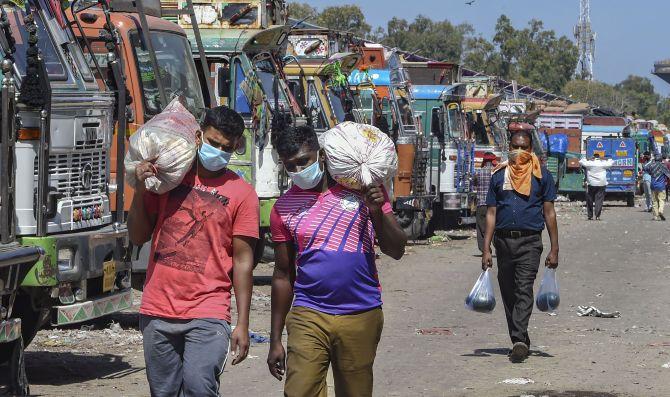It is likely the government will divide the country into different zones during the proposed extended lockdown and may permit a few services to function in safe zones.

Even as the country awaits a formal announcement by Prime Minister Narendra Damodardas Modi to extend the nationwide lockdown, Telangana became the fourth state to extend it till April 30. The current phase of lockdown ends on Tuesday.
According to finance ministry sources, the PM might address the nation once the Centre shapes the contours of the plan to revive economic activity in a phased manner.
The Centre is keen to restart economic activity in 'green zones' or areas with a low incidence of COVID-19 cases.
Some of the states showed how a less than total lockdown is likely to be enforced, with the Delhi government categorising COVID-19 areas, depending on the intensity of the spread, as red, orange, and green.
Delhi Chief Minister Arvind Kejriwal said containment zones had been declared as red and orange as high-risk.
While a final plan is in the works, one suggestion is to classify areas with more than 15 cases as red, fewer than 15 orange, and no cases as green.
The government is considering a blanket approval to all forms of farming activity with proper safety measures in place, and not just specific activities within farming as has been the case.
Some states are also keen to start at least industries producing essential commodities.
The Uttar Pradesh government has helped reopen 5,281 industrial units during the lockdown period. These are mostly involved in manufacturing of medical supplies and essential commodities.
A senior government official in the Haryana government said the state managed to retain around 50 per cent of the labour who were migrating back to their native places. However, some of the state's industrial areas, like Gurugram and Faridabad, also fall in the 'red zone' because of the spread of the virus, and cannot be opened right now.
Construction activity would also commence in Haryana, but only after approvals are taken by contractors for standard operating procedure with social distancing of workforce in mind.
Officials say most of these green zones are likely to be in rural areas, as they are less affected by the pandemic compared to the cities.
Hence, top priority is to restart activity in the agriculture sector, with timely harvesting of the late rabi crop being the main concern.
For this, the biggest impediment is labour.
The Centre is working with states on how to make agricultural manpower available, and whether limited transportation for such labour force can be allowed.
"There are some hotspots or 'red zones' where nothing can be restarted. A majority of such clusters are in urban or semi-urban areas. Based on what we are receiving from states so far, rural India is less affected than urban India. Hence, reviving farm activity is top priority," said a senior official.
In the green zones in urban and industrial areas, the Centre is again keen to restart activity as much as possible, with strict social distancing and health norms. These details are being worked out with states and industry representative bodies.
Bodies like the Federation of Indian Chambers of Commerce and Industry and the Confederation of Indian Industry have offered their own SOPs and road map for partial resumption of activity.
On Sunday, former Congress president Rahul Gandhi cautioned against takeovers of Indian corporates. 'The massive economic slowdown has weakened many Indian corporates, making them attractive targets for takeovers. The government must not allow foreign interests to take control of any Indian corporate at this time of national crisis, he tweeted.
In Haryana, the state government has tried to retain its labour force. "In consultation with industry, we devised ways so that the labour could be housed and given food and other essential items within the factory premises," an official said.
This was being done in all industrial areas, including Panipat and Yamunagar. The manufacturing hubs of Gurugram and Faridabad, however, would not open up anytime soon since Chief Minister Manohar Lal Khattar said on Friday that these areas fell under the state's red zone.
As for harvesting, the Centre has already relaxed almost all major harvesting and sowing, repair of farm machinery, export of farm goods and also import of plant chemicals from the purview of lockdown guidelines, but even if something remains, the blanket approval will take care of that.
Most big rabi-producing states of Punjab, Haryana, Madhya Pradesh, UP, and Rajasthan have staggered their procurement to enable farmers to come in batches, so that there is no overcrowding.
The number of purchase centres has also been substantially high, while in UP, the state government has planned doorstep-purchase of wheat from growers.
Punjab has issued 2.7 million coupons to farmers for bringing wheat crop to mandis, while the number of purchase centres has also been expanded to around 3,691 in the state by involving 1,824 rice mills, against 1,840 last year to avoid overcrowding.
A farmer shall be entitled to take multiple coupons each day or on different days depending on space in the purchase centre in order to avoid rush in the mandis, the official said.
Similar arrangement has also been put in place in Rajasthan. The coupons with holograms will allow farmers to bring their crop to mandis in their tractor trolleys.
To ensure social distancing at grain markets, the ground space at mandis has been divided into 30x30 feet for 50 quintals of crop, the official added.
Curfew restrictions are in place in Punjab in the wake of the COVID-19 outbreak.
Farmers will be required to bring minimum possible persons with tractor trolley in order to avoid gathering at grain markets.
Meanwhile, the vegetable market of Azadpur in Delhi, which is among the biggest in Asia, has introduced a system of odd-even, a sort of staggered timings -- 6 am to 11 am for sale of vegetables and 2 pm to 6 pm for sale of fruits -- at the mandi.
The decisions were taken following reports that social distancing rules were not being followed at the mandi, which spreads over 80 acres.
'Under the odd-even rules, we will allow all the 22 sheds to operate, according to their numbers. For instance, on an even date, even-numbered sheds such as 0, 2, 4, 6, 8 will be allowed to function. This will help us maintain social distancing in the market in view of the COVID-19 outbreak,' Adil Ahmad Khan, chairman of the Agricultural Produce Marketing Committee, Azadpur, told PTI.
Odd-even rules may also be implemented at other wholesale markets of the national Capital.
In UP, the state government has proactively resolved issues pertaining to labour, passes, and transport.
Relaxing the lockdown restrictions, Kerala on April 10 notified that rubber plantation workers could set up rain guards. Besides, washing machine and other household equipment repair has been allowed on one day of the week.
In related developments, Union Minister Ram Vilas Paswan said the Centre had enough foodgrain for nine months of PDS supply to over 810 million beneficiaries.
Kerala Finance Minister Thomas Isaac said the Centre should allow states to directly borrow from the Reserve Bank of India.
An Assam government order on Sunday evening allowed liquor shops, bottling plants, and breweries in the state to open for limited hours from Monday, PTI reported.
The Haryana government had issued a similar order on Saturday. Its excise department had instructed district administrations to ensure operations of distilleries, bottling plants, wineries with immediate effect and full operations after lockdown is lifted. However, these will not be allowed in 'red zones'.
Both Haryana and Assam are ruled by the Bharatiya Janata Party and this could enthuse other states to start manufacturing, bottling, and sale of liquor.
Meghalaya, too, decided to allow wine shops to operate in the state from Monday owing to demand from the people, said officials.
With inputs from Ruchika Chitravanshi and Archis Mohan











